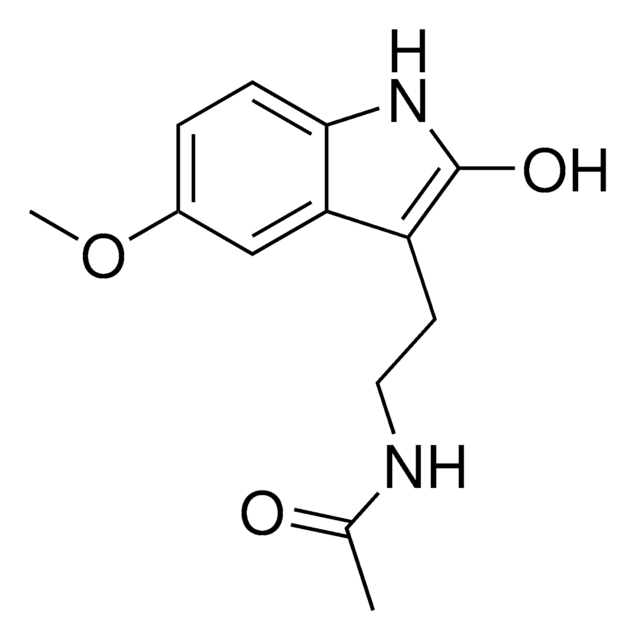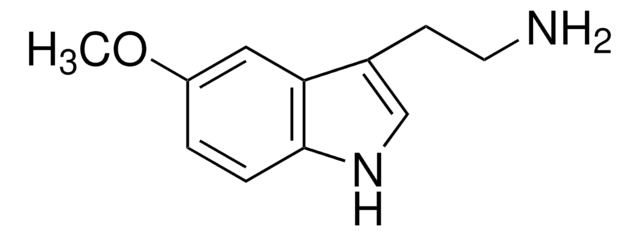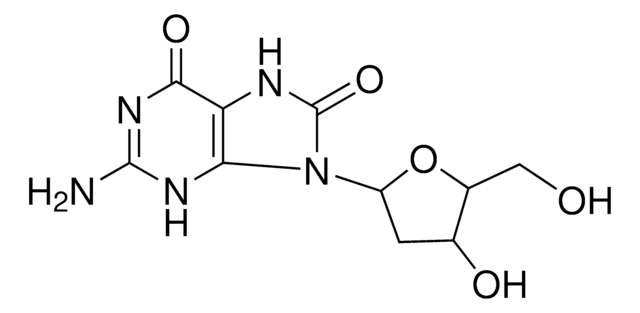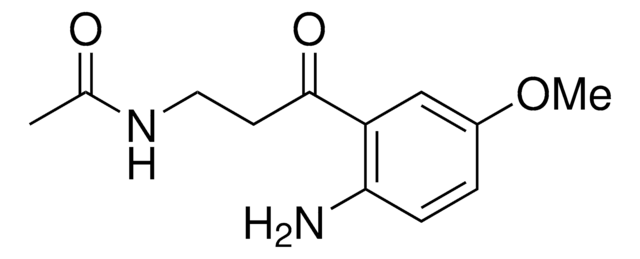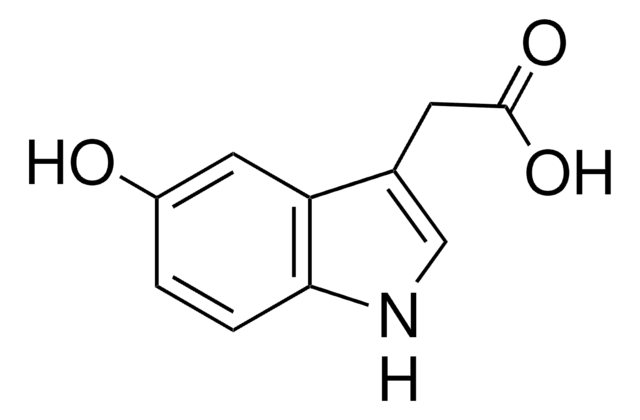H0627
6-Hydroxymelatonin
Synonym(s):
3-(N-Acetylaminoethyl)-6-hydroxy-5-methoxyindole
Sign Into View Organizational & Contract Pricing
All Photos(2)
About This Item
Empirical Formula (Hill Notation):
C13H16N2O3
CAS Number:
Molecular Weight:
248.28
MDL number:
UNSPSC Code:
41116107
PubChem Substance ID:
NACRES:
NA.77
Recommended Products
solubility
alcohol: soluble
Quality Level
SMILES string
COc1cc2c(CCNC(C)=O)c[nH]c2cc1O
InChI
1S/C13H16N2O3/c1-8(16)14-4-3-9-7-15-11-6-12(17)13(18-2)5-10(9)11/h5-7,15,17H,3-4H2,1-2H3,(H,14,16)
InChI key
OMYMRCXOJJZYKE-UHFFFAOYSA-N
Gene Information
human ... MTNR1A(4543) , MTNR1B(4544)
Looking for similar products? Visit Product Comparison Guide
Related Categories
General description
6-Hydroxymelatonin (6-OHM) is a melatonin metabolite. It is produced in the liver by the action of cytochrome P450 enzyme as well as by photodegradation of melatonin. In the central nervous system, it exists as a sulfated form. 6-OHM is a partial melatonin receptor MT2 agonist.
Application
6-Hydroxymelatonin has been used as a melatonin derivative to test its protective effects in ultra violet B (UVB)-induced oxidative stress melanocytes and keratinocytes.
Biochem/physiol Actions
6-Hydroxymelatonin (6-OHM) is an antioxidant with a free radical scavenging role. Like melatonin, it reduces the impact of UVB-induced oxidative stress in melanocytes. It also aids protection during iron (Fe2+)-induced neurotoxicity. 6-OHM effectively reduces lipid peroxidation and superoxide anion production induced by potassium cyanide (KCN).
Signal Word
Warning
Hazard Statements
Precautionary Statements
Hazard Classifications
Acute Tox. 4 Oral - Carc. 2
Storage Class Code
11 - Combustible Solids
WGK
WGK 3
Personal Protective Equipment
dust mask type N95 (US), Eyeshields, Gloves
Choose from one of the most recent versions:
Already Own This Product?
Find documentation for the products that you have recently purchased in the Document Library.
G Facciolá et al.
European journal of clinical pharmacology, 56(12), 881-888 (2001-04-25)
The present study was carried out to identify the cytochrome P450 enzyme(s) involved in the 6-hydroxylation and O-demethylation of melatonin. The formation kinetics of 6-hydroxymelatonin and N-acetylserotonin were determined using human liver microsomes and cDNA yeast-expressed human enzymes (CYP1A2, 2C9
Xuwan Liu et al.
American journal of physiology. Heart and circulatory physiology, 283(1), H254-H263 (2002-06-14)
The present study was designed to explore the protective effects of melatonin and its analogs, 6-hydroxymelatonin and 8-methoxy-2-propionamidotetralin, on the survival of doxorubicin-treated mice and on doxorubicin-induced cardiac dysfunction, ultrastructural alterations, and apoptosis in mouse hearts. Whereas 60% of the
Katsuhisa Sakano et al.
Biochemical pharmacology, 68(9), 1869-1878 (2004-09-29)
Melatonin, an indolic pineal hormone, is produced primarily at night in mammals and is important in controlling biological rhythms. Although melatonin is known to be effective as a free radical scavenger and has an anti-cancer effect, carcinogenic properties have also
S Härtter et al.
Therapeutic drug monitoring, 23(3), 282-286 (2001-05-22)
Melatonin has recently garnered interest as a possible treatment for sleep disorders, and this has created a desire for appropriate pharmacokinetic studies. No method has yet been published that can measure the concentrations of both melatonin and its main metabolite
Zorica Janjetovic et al.
Scientific reports, 7(1), 1274-1274 (2017-04-30)
Ultraviolet light (UV) is an inducer of reactive oxygen species (ROS) as well as 6-4-photoproducts and cyclobutane pyrimidine dimers (CPD) in the skin, which further cause damage to the skin cells. Irradiation of cultured human melanocytes with UVB stimulated ROS
Our team of scientists has experience in all areas of research including Life Science, Material Science, Chemical Synthesis, Chromatography, Analytical and many others.
Contact Technical Service
